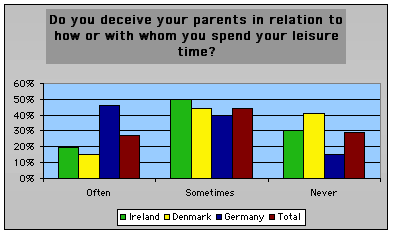 |
 |
 |
 |
 |
 |

Q. 12 Just over one quarter of all those surveyed admitted to frequently deceiving their parents while another 45% sometimes did. Only 12% of German female students never deceive their parents while an amazing 60% do so frequently. Maybe this is a result of having a lot of discipline and rules.
Q 13. More than two thirds of Danes do not consider that they are being too pressurised in relation to school performance. Just over a half of Irish students do not feel pressured while almost one third of Germans are not under pressure, although 60% of German females consider that their parents exert too much pressure in relation to performing well at school.
Q.14 Overall just over one quarter of students surveyed believed that their parents were not well informed about teenage issues and behaviour. More than 4 out of 5 Claremorris students consider that their parents are either well, or very well informed in this area. Just less than three quarters of students in Newry and Aarhus share the same view. However 33% of Dublin students and 37% of students from Aurich consider their parents are not well informed. Haslev parents should be delighted to hear that an amazing 91.5% of their offspring believe them to be well/very well informed about teenage issues.
Q. 15 Overall one in five students surveyed considered that they were 'not well' understood by their parents. However there are big variations in the results. Although overall both Germany and Denmark yield an 18% 'not well' understood result this figure is a little misleading as again Haslev students buck the trend with only 11% of students feeling 'not well' understood by their parents. Surprisingly, considering the results of question 14, almost one third of Claremorris students feel misunderstood by their parents. In all cases, except Haslev, where the reverse was true, boys tended to feel less well understood than girls.
Q. 16 Only 12% of those surveyed would approach their fathers with a serious problem. Irish fathers appear to be the least approachable from their daughters' perspectives. Only 2% of Dublin female students would discuss a serious problem with their fathers while none of their Claremorris or Newry counterparts would do so. Danish fathers fare hardly better with their daughters as only 3% of Haslev females and 6% of Risskov girls would find their fathers approachable in this area. German fathers are much more approachable where 1 in 5 of their daughters would discuss serious problems with them. A worrying result for Claremorris parents must be that almost two thirds of males and one third of females would discuss serious problems with neither of their parents. Newry also could not take comfort in the fact that almost 40% of their students would also not approach either of their parents in relation to a serious problem.
Q. 17 Despite the obvious communication problems (particularly in Ireland) highlighted in question 16) 80% of students rate their relationship with their parents as either excellent or good. Less than 3% of respondents rate their relationship as bad.
Q. 18 Overall Alcohol and Drugs is the most contentious issue between parents and students, while friends and religion are issues that cause least friction. More than one third of Claremorris students identify Alcohol and Drugs as the issue causing most friction at home, almost 20 per cent of Newry students also confirm this finding as do one quarter of Dublin students. However this is not surprising given the very recent OECD report which identifies Irish teenagers as Europe's second highest alcohol consumers. However although Danish teenagers are identified in the same report as Europe's heaviest drinkers of alcohol while the issue causes most friction for 23% of Risskov teenagers only 8% of Haslev students consider it a cause of friction at home. One in 4 German students consider Alcohol and Drugs to be the most divisive issue between themselves and their parents. For all students smoking is the second highest cause of friction at home closely followed by homework.
Q. 19 Friends are the most influential group according to the Danes and Germans followed by Parents/Guardians. In third place Other Family Members are selected by Danes while the Germans allocated third place to Pop Groups/Magazines. Parents/Guardians occupy the most influential position according to Irish students followed by Friends and Other Family Members. Both the Irish and Danes award the wooden spoon to Pop Groups/Magazines as the least influential group while this 'accolade 'is reserved for Teachers by the Germans.
Q. 20 More than 80% of all those surveyed considered it either very or fairly important to please their parents. Less than 1 in 10 of both Danes and Irish students considered it not important to please parents. A surprising 36% of Germans were not too bothered about impressing their parents.